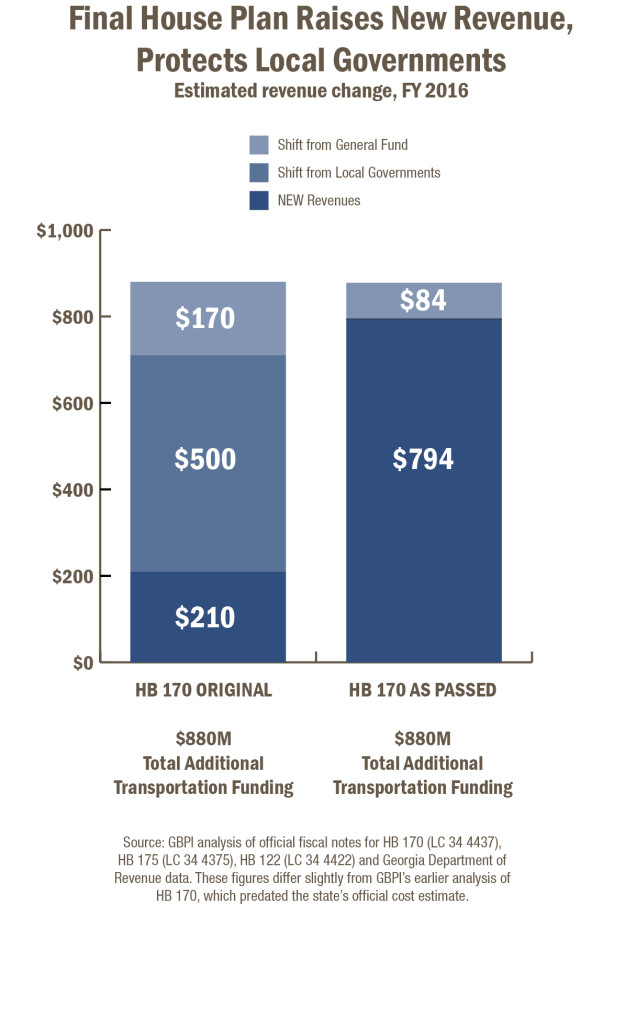The Georgia House of Representatives passed House Bill 170 last week, legislation that could generate nearly $1 billion a year in extra state funding for transportation. Its passage comes after more than a month of spirited debate that delivered several important changes, many for the better. The improving bill now lies in the hands of state senators, who get an opportunity to polish it a bit more. The Georgia Budget and Policy Institute’s new four-page analysis of the House-passed plan provides more specifics.
Here are some key takeaways about where HB 170 stands now: 
- It raises new revenues rather than just shifting money around. The originally filed version of HB 170 mostly moved existing pots of state and local money around as opposed to raising new revenues, as GBPI explained in a prior analysis. That accounting gimmick threatened serious problems for state and local lawmakers working to adequately fund schools, hospitals and other vital needs. But the revised version of HB 170 makes several changes to partially offset this problem, as illustrated in the accompanying chart.
- It protects local governments. The big change from the original bill is HB 170 no longer raids the budgets of Georgia’s local governments. Cities and counties are now allowed to apply their local sales taxes (LOST, SPLOST and ESPLOST) to gasoline. The legislation as first filed proposed to end that practice at a cost of around $500 million a year for schools, jails and other local needs. The revised plan allows local governments to continue applying SPLOST and ESPLOST taxes to gasoline, conserving about $350 million a year for schools and voter-approved capital projects. The remaining local revenue is recovered through a separate technical change to Georgia’s local-option sales tax (LOST), which pays for property tax rollbacks and general local needs.
- It partially protects other state services. The legislation also now shifts less money from the state general fund than before. The plan still moves the so-called fourth penny from general needs to transportation, cutting about $170 million a year out of Georgia’s main bank account for funding non-transportation services. At the same time it eliminates tax breaks for Delta Air Lines and electric car drivers, cutting the general fund reduction roughly in half. Lawmakers will need to cut other vital state services to come up with the other $85 million or so, unless they raise additional revenues.
The version of HB 170 state senators will now consider is a big improvement over the bill’s first edition, but there’s still room for improvement. The package still shifts some money from other yet-to-be-determined state services. It also just reaches the $1 billion a year target most observers agree is the bare minimum to maintain existing roads and bridges. It’ll likely take at least twice that to tackle the full range of necessary investments, like building new arterial roads and expanding transit.
Georgia might only get one bite at the apple on transportation for the foreseeable future, given the political difficulty of raising revenues. Senators can make the most of this window of opportunity by treating the House-passed plan as the minimum needed, rather than a ceiling.
Legislators should protect the new revenues in the House plan and also bolster them. Lawmakers possess a number of reasonable options to raise more revenue, such as hiking Georgia’s cigarette tax by up to $1.23 per pack or casting a skeptical eye at Georgia’s costly array of tax breaks. Those options would likely fill the hole in Georgia’s general fund. Additional transportation revenues could come from sources like special fees on rental cars or commercial vehicles, broader use of tolls and more local flexibility for counties interested in passing transportation sales taxes. The trick is to consider these ideas in addition to, rather than in place of, the House’s well-considered starting point.
House leaders deserve credit for positive refinements to their initial plan and setting a solid baseline to start solving Georgia’s transportation crisis. State senators can now seize the momentum and tackle Georgia’s transportation crisis in a big way. Doing the bare minimum or even less means continued neglect of the state transportation system and just kicks this difficult debate down the road.




2 thoughts on “Transportation Plan Takes Positive Turn, Has a Few Miles to Go”
What about public transit funding?
Pingback: Georgia state lawmakers to reconvene Wednesday for Day 31 of 2015 session | annmintzblog